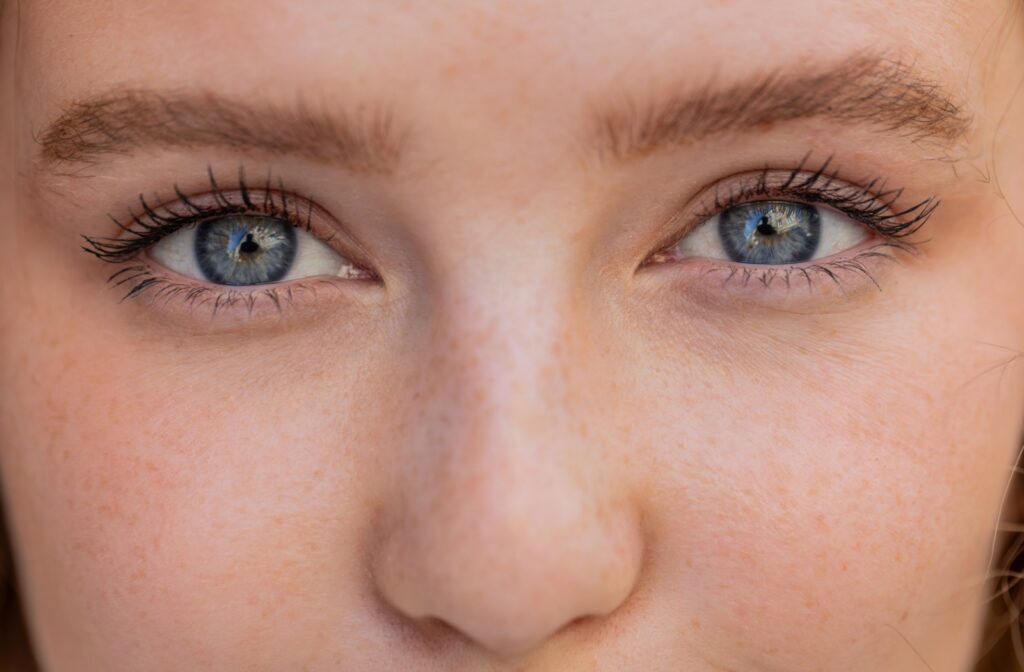Have you ever stepped outside on a sunny day and felt like the light was just too bright for your eyes to handle? If you have blue or light-colored eyes, you might notice this more often than your brown-eyed friends. Blue eyes can be more sensitive to light, and there’s a scientific reason behind it.
At The Eye Gallery, we’re here to help you understand how your eye color plays a role in light sensitivity and what you can do to protect your vision.
Why Are Blue Eyes More Sensitive to Light?
The amount of melanin in your eyes plays a major role in how they respond to light. Melanin is the pigment that gives color to your skin, hair, and eyes. In the case of your eyes, it also acts like a natural filter. It helps absorb and block some of the incoming light, especially harsh or harmful light like UV rays.
Blue eyes contain significantly less melanin than brown or darker-colored eyes. With less pigment to absorb light, more of it enters the eye, making bright environments, like a sunny day, a snowy landscape, or even intense indoor lighting, potentially overwhelming or uncomfortable.
This lack of natural protection is what makes people with blue eyes more prone to photophobia, the medical term for light sensitivity.
The Protective Role of Melanin in the Eye
Melanin doesn’t just help block light; it plays a protective role in overall eye health. It helps shield delicate internal eye structures from UV damage and oxidative stress. For people with blue eyes, this reduced melanin means there’s a slightly increased risk over time for conditions related to light exposure, such as:
- Macular degeneration
- Cataracts
- Retinal damage from UV exposure
While this doesn’t mean that blue eyes are unhealthy, it does highlight the importance of taking proactive steps to protect your eyes, especially in bright or high-glare environments.
What Does Light Sensitivity Feel Like?
Light sensitivity can manifest in different ways. Some people might squint or feel discomfort in bright sunlight. Others might experience eye strain, headaches, or even migraines when exposed to strong indoor lighting or digital screens for extended periods.
In some cases, light sensitivity can also be linked to other eye conditions like dry eye disease, which affects tear production and leads to irritated or gritty-feeling eyes. If your eyes often feel tired, uncomfortable, or overly sensitive to light, it’s worth talking to your eye doctor.
How to Manage Light Sensitivity with Blue Eyes
If you have blue or light-colored eyes, don’t worry—you’re not powerless against bright light. There are plenty of practical steps you can take to minimize discomfort and protect your vision.
Wear Polarized Sunglasses with Full UV Protection
One of the easiest and most effective ways to manage light sensitivity is to wear sunglasses. Look for polarized lenses that also offer 100% UVA and UVB protection. Polarized lenses reduce glare, especially from surfaces like water, snow, or pavement, all of which can be particularly harsh on light-sensitive eyes.
At The Eye Gallery, we carry a curated selection of stylish, protective sunglasses designed to keep your eyes comfortable in all kinds of lighting.
Choose Anti-Reflective Lenses for Your Glasses
If you wear prescription glasses, consider adding an anti-reflective (AR) coating to your lenses. AR coatings reduce reflections from computer screens, overhead lighting, and car headlights, making it easier for your eyes to adjust and reduce strain in bright environments.
This small upgrade can make a big difference in how your eyes feel, especially if you spend long hours on screens or driving at night.
Take Breaks from Screens
Blue eyes don’t just react to natural light; they can be sensitive to artificial light too. Staring at screens for long periods can lead to digital eye strain, which can worsen light sensitivity.
Try following the 20-20-20 rule: every 20 minutes, look at something 20 feet away for at least 20 seconds. This helps your eyes reset and prevents fatigue.
Stay on Top of Eye Exams
Regular comprehensive eye exams are key to maintaining healthy vision and catching potential issues early. We can check for underlying conditions that may be contributing to light sensitivity and recommend personalized solutions, whether that means new lenses, dry eye treatment, or something else entirely.
If you haven’t had an eye exam in the past year, now’s a great time to book an appointment.

Address Dry Eyes
Dry eye disease can often go hand-in-hand with light sensitivity. When your eyes aren’t producing enough quality tears, they become more vulnerable to environmental factors; including light.
If your eyes feel dry, gritty, or irritated, we can help. Our team offers tailored dry eye treatments, including artificial tears, punctal plugs, and in-office therapies designed to restore comfort and protect your eyes.
Support Eye Health with Lifestyle Habits
What you eat and how you care for your body can impact your eyes. A diet rich in omega-3 fatty acids, vitamin A, and antioxidants supports healthy tear production and helps protect against age-related changes to your eyes.
Staying hydrated, using soft lighting at home, and wearing hats or visors outdoors can all help reduce light exposure and protect your eyes.
Let’s Keep Your Eyes Comfortable & Protected
Having blue eyes means you may be more sensitive to light, which is all the more reason to prioritize your eye care. By taking a few simple precautions, you can reduce discomfort, safeguard your vision, and enjoy clear, comfortable sight in all kinds of environments.
At The Eye Gallery in Wichita Kansas, we’re here to help you make the most of your vision. Whether you’re looking for polarized sunglasses, need help managing light sensitivity, or want a recommendation for lenses, our experienced team is ready to support your eye health with expert care and premium eyewear options.
Feel like light sensitivity is affecting your daily life? Book an eye exam with us today, and let’s find the right solution for your eyes.




